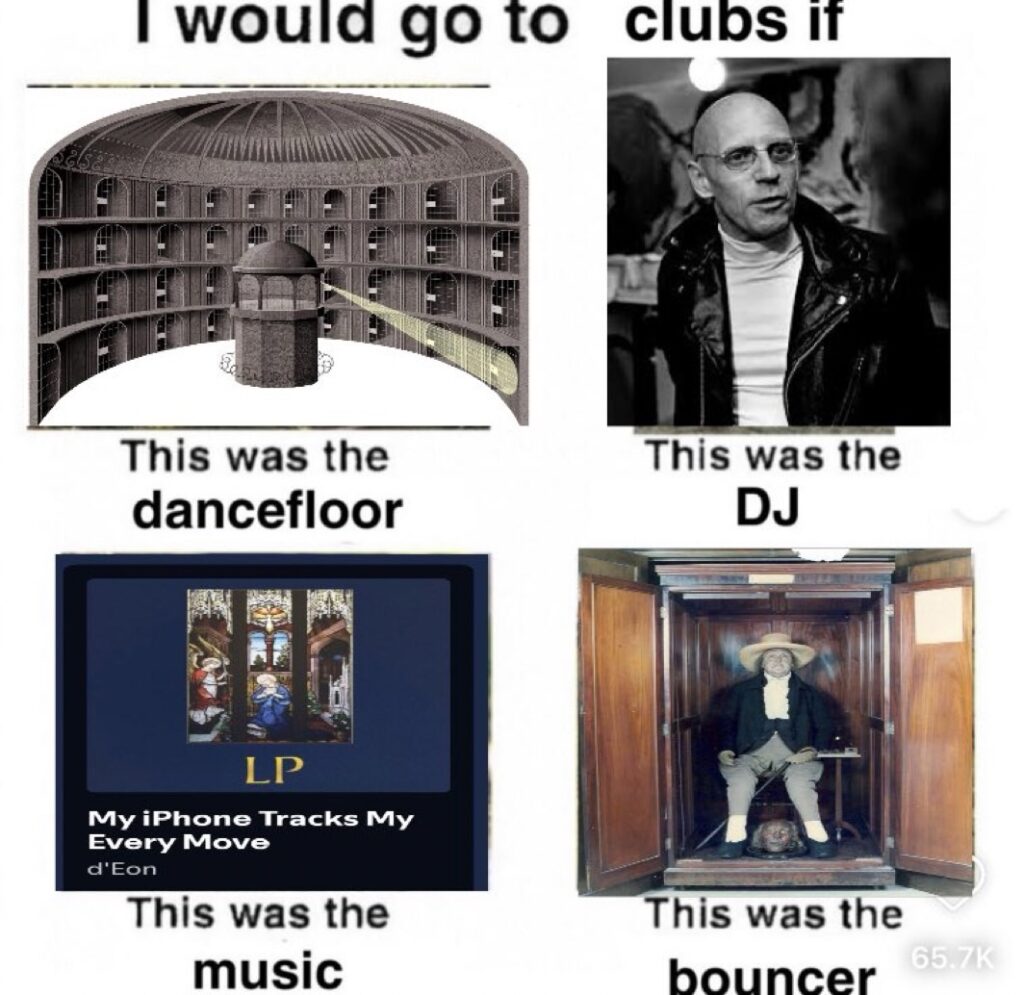
Somewhere between the last cigarette of the night and the first hit of morning regret, a meme appeared—a meme that hit like a bad trip laced with too much truth. “I would go to clubs if…” it begins, and already we’re hooked, because we would. Oh, we absolutely would. Clubs, after all, are temples to our twin gods: attention and surveillance. The dancefloor is no place for freedom—it’s a marketplace of souls, a performance arena where we barter our autonomy for the sweet narcotic of being seen.
The meme lays it all out in stark, hilarious terms. The dancefloor? A Panopticon, that circular prison where every move you make is visible, every act observed, judged, cataloged. The DJ? None other than Michel Foucault, the great philosopher of power and control, standing there in his leather jacket like the grinning high priest of disciplinary pleasure. The music? “My iPhone Tracks My Every Move,” a track that isn’t just a beat to lose yourself to—it’s a hymn to our self-inflicted surveillance, a confession that the algorithm knows us better than we know ourselves. And the bouncer? A relic from the Victorian era, grim and judging, sitting in his booth like he’s guarding the gates to Hell, or worse, your search history.
It’s a joke, sure. But like all good jokes, it cuts deep because it’s true.
We don’t just tolerate surveillance—we crave it. We ache for the gaze of the all-seeing eye, for the validation it provides. You might laugh at the Panopticon dancefloor, but let’s not kid ourselves: we’re already there. Every selfie you post, every location you tag, every dopamine hit from that sweet, sweet notification is proof. The prison is not imposed upon us—we willingly step into it, strutting in time to the beat, pretending we don’t notice the cameras.
And let’s talk about that beat. In the meme, the music is a stroke of genius. “My iPhone Tracks My Every Move” isn’t a song; it’s an anthem for the age of surveillance capitalism. It’s the soundtrack of our complicity, a reminder that every swipe and scroll is another step deeper into the algorithmic quicksand. The music isn’t background noise—it’s the main event. It’s tailored to your preferences, curated from the metadata you provided so eagerly. You don’t choose the song; it chooses you. And God help you, you love it.
Then there’s Foucault, our DJ, grinning like he knows something you don’t. And he does. Foucault taught us that power isn’t just about force—it’s about visibility, about shaping behavior through the simple fact of being watched. The Panopticon doesn’t need guards because the prisoners police themselves. And isn’t that exactly what we do? Every post, every like, every performative little moment we broadcast to the void is an act of self-surveillance. We’re not dancing to escape—we’re dancing to be noticed.
The bouncer, though, is the meme’s cruelest joke. He’s a relic, a grotesque reminder that there was a time when judgment was blunt and personal. Now, the judgment is softer, subtler, but no less suffocating. The bouncer doesn’t sit in the doorway anymore; he’s in your pocket, a voice whispering in your ear every time you check your stats, your likes, your engagement. He doesn’t stop you from entering—he lets you in and makes damn sure you never leave.
The meme is funny because it exposes the lie we tell ourselves: that we fear surveillance. We don’t. We love it. We dress up for it, pose for it, curate our lives around it. We’ve turned the Panopticon into a nightclub and sold tickets at the door. We’ve made surveillance sexy, seductive, irresistible. And in doing so, we’ve revealed the ultimate truth: the watchers don’t hold the power. We do. Because we feed them. We demand their gaze. We scream into the void, “Watch me! Validate me! Tell me I matter!”
And so we dance. Under the lights of the Panopticon, to the beats of the algorithm, under the watchful eye of Foucault and his disciples. We dance, knowing full well that we’re not free. But freedom was never the point. The point was to be seen, to bask in the glow of attention, to know that even if the prison doors are open, we’ll never walk away.
So the next time you see that meme, don’t laugh too hard. You’re already in the club, my friend. And the music’s just getting started.